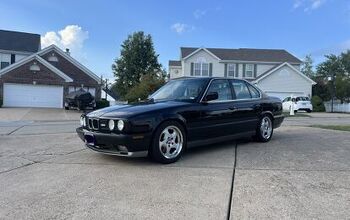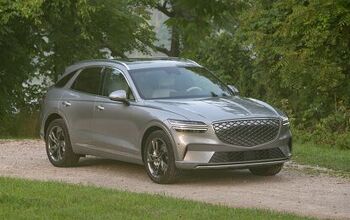Great Wall's Descent A Sign Local Industry Not Ready For Primetime
Once the darling of investors amid ambitions of taking on foreign automakers such as Jeep with its line of SUVs, Great Wall Motors’ recent fall from grace on the back of the upscale Haval H8 may be a sign Chinese automakers are not yet ready to move from production of cheap transportation.
Bloomberg reports production of the 200,000 yuan ($32,100 USD) SUV, aimed at the likes of the Volkswagen Tiguan and Ford Kuga, was suspended indefinitely earlier this month amid quality concerns regarding “knocking noises” from the six-speed automatic transmission at high speeds. The second delay of the H8 — the first occurring earlier this year after local press panned the SUV in test drives — sent Great Wall’s stock price down 17 percent, while seven analysts cut their ratings of the automaker due to perceived weaknesses in the overall local industry from the suspension. Oriental Patron Financial Group analyst Vivien Chen, one of the seven, explains:
We believe the event indicates domestic automakers haven’t met requirements to upgrade to be a high-end vehicle maker. The event definitely hurt customers’ perception of H8, and hurt company image.
The suspension is the latest stumbling block for Great Wall, having faced a recall with Chery of 23,000 units from Australia in 2012 when banned asbestos parts were found in some models. In addition, 2013 exports fell 22 percent to nearly 75,000 units due to currency challenges in Japan and South Korea. Locally, the automaker is faring better, having moved almost 112,000 SUVs over its competitors so far in 2014, though the market overall fell 2.5 percent in April to 37.1 percent for local automakers, the eight consecutive month this has occurred.
Despite the setbacks, Macquarie Group analyst Janet Lewis believes Great Wall and the rest of the Chinese automakers may be able to learn from the experience as they move forward toward selling their wares to developed markets such as the United States, though they all still have a long road ahead of them, as Sanford C. Bernstein analyst Max Warburton points out with Great Wall:
The company faces monumental challenges in trying to move up a league in the automotive world, and the problems faced by the H8 confirm Great Wall is struggling with technology. Serious questions will now be asked about Great Wall’s growth potential.
Seattle-based writer, blogger, and photographer for many a publication. Born in Louisville. Raised in Kansas. Where I lay my head is home.
More by Cameron Aubernon
Latest Car Reviews
Read moreLatest Product Reviews
Read moreRecent Comments
- Ltcmgm78 It depends on whether or not the union is a help or a hindrance to the manufacturer and workers. A union isn't needed if the manufacturer takes care of its workers.
- Honda1 Unions were needed back in the early days, not needed know. There are plenty of rules and regulations and government agencies that keep companies in line. It's just a money grad and nothing more. Fain is a punk!
- 1995 SC If the necessary number of employees vote to unionize then yes, they should be unionized. That's how it works.
- Sobhuza Trooper That Dave Thomas fella sounds like the kind of twit who is oh-so-quick to tell us how easy and fun the bus is for any and all of your personal transportation needs. The time to get to and from the bus stop is never a concern. The time waiting for the bus is never a concern. The time waiting for a connection (if there is one) is never a concern. The weather is never a concern. Whatever you might be carrying or intend to purchase is never a concern. Nope, Boo Cars! Yeah Buses! Buses rule!Needless to say, these twits don't actual take the damn bus.
- MaintenanceCosts Nobody here seems to acknowledge that there are multiple use cases for cars.Some people spend all their time driving all over the country and need every mile and minute of time savings. ICE cars are better for them right now.Some people only drive locally and fly when they travel. For them, there's probably a range number that works, and they don't really need more. For the uses for which we use our EV, that would be around 150 miles. The other thing about a low range requirement is it can make 120V charging viable. If you don't drive more than an average of about 40 miles/day, you can probably get enough electrons through a wall outlet. We spent over two years charging our Bolt only through 120V, while our house was getting rebuilt, and never had an issue.Those are extremes. There are all sorts of use cases in between, which probably represent the majority of drivers. For some users, what's needed is more range. But I think for most users, what's needed is better charging. Retrofit apartment garages like Tim's with 240V outlets at every spot. Install more L3 chargers in supermarket parking lots and alongside gas stations. Make chargers that work like Tesla Superchargers as ubiquitous as gas stations, and EV charging will not be an issue for most users.































Comments
Join the conversation
The asbestos is being replaced with the lead they used to use in toy paint and the sulfur they used to put in drywall. It will instead be used as a substitute for melamine in infant formula.
Until they have a uniform rule of law, fixing one company or one industry isn't going to make it work out. Every judge is a feudal lord, and unless the council of kings is angered enough to off him, his word is law. We can hate on government regulation, but it's total absence is a bit of a challenge, especially if your competitors are less ethical than you are.